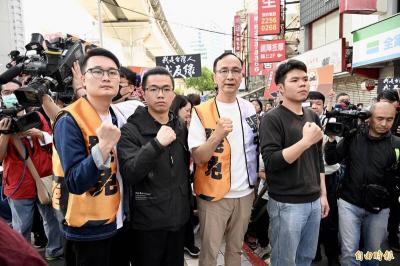The Taiwan Swine Association expressed strong opposition to imports of US pork containing traces of the leanness-enhancing agent ractopamine, saying that it would not change its position unless scientific evidence proves that such meat poses no health risk.
“We will stand against [such imports] to the end,” association secretary-general Chang Sheng-chin (張生金) said.
The Agricultural Technology Research Institute has been studying the impact of the use of leanness-enhancing drugs on pigs, while the Ministry of Health and Welfare has been running a health safety assessment on consumption of pork containing ractopamine, Chang said.
At the moment, all members of his association insist that the government must uphold the ban on imports of US pork containing traces of ractopamine, Chang said.
The industry renewed its strong opposition to US pork imports as Taiwan and US officials were engaging in a trade dialogue in Taipei.
The US International Trade Commission in a trade report published on Tuesday said that at a meeting between Taiwan and the US under the Trade and Investment Framework Agreement platform last year, the two sides agreed that more progress was needed on a broad range of agricultural trade issues.
“The United States was mostly concerned about the degree to which biotechnology plays a role in Taiwan’s agricultural trade policies, and expressed strong interest that Taiwan remove bans on US pork and certain beef products produced using ractopamine,” the report said.

The Ministry of Economic Affairs has fined Taobao NT$1.2 million (US$36,900) for advertisements that exceeded its approved business scope and ordered the Chinese e-commerce platform to make corrections in the first half of this year or its license would be revoked. Lawmakers have called for stricter supervision of Chinese e-commerce platforms and more stringent measures to prevent China from laundering its goods through Taiwan as US President Donald Trump’s administration cracks down on origin laundering. The legislature’s Finance Committee yesterday met to discuss policies to prevent China from dumping goods in Taiwan, inviting government agencies to report on the matter. Democratic Progressive Party

Taiwan and its Pacific ally Tuvalu on Tuesday signed two accords aimed at facilitating bilateral cooperation on labor affairs, according to Taiwan’s Ministry of Foreign Affairs (MOFA). The governments inked two agreements in Taipei, witnessed by Foreign Minister Lin Chia-lung (林佳龍) and visiting Deputy Tuvaluan Prime Minister Panapasi Nelesone, MOFA said in a news release. According to MOFA, the agreements will facilitate cooperation on labor issues and allow the two sides to mutually recognize seafarers’ certificates and related training. Taiwan would also continue to collaborate with Tuvalu across various fields to promote economic prosperity as well as the well-being of their

Taiwan would welcome the return of Honduras as a diplomatic ally if its next president decides to make such a move, Minister of Foreign Affairs Lin Chia-lung (林佳龍) said yesterday. “Of course, we would welcome Honduras if they want to restore diplomatic ties with Taiwan after their elections,” Lin said at a meeting of the legislature’s Foreign Affairs and National Defense Committee, when asked to comment on statements made by two of the three Honduran presidential candidates during the presidential campaign in the Central American country. Taiwan is paying close attention to the region as a whole in the wake of a

The Taipei District Prosecutors’ Office has continued its investigation into allegations of forged signatures in recall efforts today by searching the Chinese Nationalist Party’s (KMT) city chapter and questioning several personnel including the chapter director, according to media reports. Among those questioned and detained were KMT Taipei chapter director Huang Lu Chin-ju (黃呂錦茹), chapter secretary-general Chu Wen-ching (初文卿), chapter secretary Yao Fu-wen (姚富文) and first district committee executive director Tseng Fan-chuan (曾繁川). Prosecutors said they would not confirm reports about who had been summoned. The investigation centers on allegations that the ongoing recall campaigns targeting Democratic Progressive Party legislators Rosalia Wu (吳思瑤)